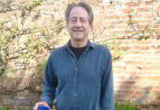 One afternoon, 12 years ago, I was doing some gentle exercises in the local gym. I was adjusting the rowing machine when, suddenly, my vision blurred and I fell sideways hitting my head on the floor. The woman on the machine next to me shouted “don’t move.” “Stupid idea,” I thought “I must get up,” only to find that I was unable to move.
One afternoon, 12 years ago, I was doing some gentle exercises in the local gym. I was adjusting the rowing machine when, suddenly, my vision blurred and I fell sideways hitting my head on the floor. The woman on the machine next to me shouted “don’t move.” “Stupid idea,” I thought “I must get up,” only to find that I was unable to move.
The trip in the ambulance and my passage through casualty to the ward are a blurred memory. I woke in a side room and became aware of a weakness in my right side and being unable to speak. No matter how hard I tried to talk I had lost the ability to do so. I was very distressed and panicky as a result, particularly when I had visitors and was unable to communicate with them.
Over the next few days I had regular physiotherapy, and the weakness in my arms and legs gradually improved. Finally I regained my strength and was able to drive again.
My speech, however, was problematic. The speech and language therapist was very helpful, encouraging me, and setting me tasks. What I found worked best was to think about what I wanted to say, practice saying it in my mind, and then to attempt to say it out loud. It was a slow process. One of my colleagues said that I sounded like a Dalek! But with continued practice, and focusing on rhythm and cadence, my speech improved.
After the stroke I felt very tired, and found it easier to let people talk to me—a skill useful in my role as a psychiatrist. My speech was worse when I was tired, anxious, or after a drink. Luckily, I can now drink again without the dreaded effects.
My MRI scan showed a partial dissection of my left internal carotid artery and an infarction of my left middle cerebral artery. It so happened I had been visiting an osteopath for severe headaches, and had had vigorous manipulation of my neck a couple of weeks previously. This probably triggered my stroke.
Through contact with “Different strokes” and the “Stroke association,” I learned to think of myself as a stroke “survivor,” and not a stroke “victim,” which was helpful in regaining my confidence.
I had sessions of acupuncture and reiki. Did they help? At the very least they made me feel that I was doing something active towards my recovery. I have taken omega 3 capsules since my stroke. Many of the parents of children I was treating with ADHD, conduct problems, and dyslexia, swear it makes a difference to their children’s behaviour. I keep taking them, I think that they have made a difference, but it may be just a placebo effect. There could be scope for a research project here.
I was surprisingly desperate to return to work as a child and adolescent psychiatrist, believing I would make better progress and feel more normal. In the event I went back after five months. It was too soon and I struggled at first. I found myself hesitating to talk at meetings, and sometimes stuttering, and envying colleagues I had previously thought rather garrulous.
My recovery has taken place over several years, with the maximum progress being made in the first few weeks and months. I am now left with a small false aneurysm at the level of C1 in my internal carotid artery, and an intermittent problem with my spelling.
I wanted to be able to share my experiences, but at first found that when I gave a vivid account of my stroke I imagined myself back in the ward and becoming anxious, stuttering, and losing my place in my narrative. A form of post traumatic stress disorder I eventually realised. Time and distance from the event has stopped this from happening.
I have given regular talks to medical students about what it was like to have a stroke, what helped in my recovery, and the rare, but significant, risk of neck manipulation. I think that they listen because I am a doctor as well as an ex-patient.
I was asked by Ann Ashburn, professor of rehabilitation at Southampton General Hospital, to talk at the second UK stroke forum. After that I was invited to speak at the launch of the results of the Royal College of Speech and Language Therapists nationwide this took place in the House of Commons. I had an extremely dry mouth during my talk.
I know that I am one of the lucky ones, to have been able to return to work after a stroke. I try to celebrate survival on birthdays, anniversaries, or whenever there is any cause for a celebration.
Tony Saunders is a retired consultant in child and adolescent psychiatry, Southampton child and adolescent mental health services.
